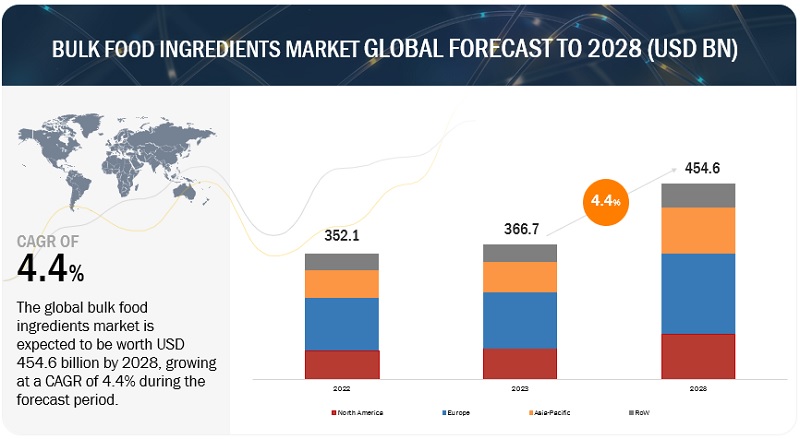The global bulk food ingredients market is projected to reach USD 454.6 billion by 2028 from USD 366.7 billion by 2023, at a CAGR of 4.4% during the forecast period in terms of value. The bulk food ingredients market has seen considerable growth over the past few years and is expected to continue expanding, driven by changing consumer preferences, a shift toward healthier food options, and increasing demand for organic and plant-based foods. The bulk food ingredients market encompasses a wide range of products, from grains, sweeteners, and oils to dairy, flavoring agents, and spices, all sold in large quantities to meet the needs of manufacturers, food processors, and retailers. In this blog, we’ll dive into the trends, drivers, challenges, and growth opportunities that define the bulk food ingredients market.

What Are Bulk Food Ingredients?
Bulk food ingredients are raw materials or semi-processed items that are sold in large quantities, typically for use by food manufacturers, restaurants, and even large-scale retailers. These ingredients include grains, flour, oils, spices, sugar, dried fruits, nuts, seeds, and many others. They are the backbone of the food industry, providing the essential components for a wide array of products, from snacks to beverages.
The primary appeal of bulk food ingredients is their cost-effectiveness. By purchasing ingredients in large quantities, businesses can save on packaging and distribution costs, making it a more economical option for both suppliers and consumers.
Bulk Food Ingredients Market Trends
- Health and Wellness Focus: As consumers become more health-conscious, there has been a notable shift toward ingredients that support healthier lifestyles. This trend includes a growing demand for natural and organic ingredients, as well as plant-based alternatives. Ingredients like quinoa, almond flour, chia seeds, and organic sweeteners are in high demand among food manufacturers looking to offer healthier products. This consumer shift is prompting businesses to prioritize healthier bulk food options.
- Plant-Based Revolution: The popularity of plant-based diets has contributed significantly to the market growth of bulk food ingredients. Plant-based protein sources, such as pea protein, soy protein, and other plant-based flour alternatives, are becoming essential ingredients in a variety of processed foods, including snacks, dairy-free products, and meat substitutes.
- Sustainability and Ethical Sourcing: Sustainability is another key factor in the growth of the bulk food ingredients market. Many consumers now demand traceability of food ingredients and a focus on environmentally friendly practices. Companies are responding by ensuring that their bulk ingredients are ethically sourced, with minimal environmental impact, and by exploring packaging solutions that reduce waste.
- Technological Advancements in Food Processing: Innovations in food processing technology have improved the efficiency and quality of bulk ingredients. For example, advancements in extraction, preservation, and storage techniques allow food manufacturers to maintain the integrity of bulk ingredients, improve shelf life, and reduce costs.
Bulk Food Ingredients Market Drivers
- Increasing Demand for Convenience Foods: The demand for ready-to-eat and convenient foods is escalating as busy lifestyles influence consumer purchasing behavior. This demand is fueling the need for bulk food ingredients, as manufacturers seek to streamline their production processes while maintaining quality.
- Rising Global Population: As the global population grows, the need for cost-effective, scalable food production increases. Bulk ingredients help manufacturers meet this need by offering a cost-effective way to produce high-volume, nutritious food products.
- Expanding Food Processing Industry: The growth of the food processing industry, particularly in emerging markets, is a significant driver of the bulk food ingredients market. As these regions develop economically and their middle class grows, demand for processed foods increases, subsequently boosting the need for bulk ingredients.
Bulk Food Ingredients Market Opportunities
- Expansion of E-Commerce Channels: With the increasing reliance on online shopping, especially in the food sector, there is an opportunity for bulk food ingredient suppliers to tap into the e-commerce market. Companies can offer bulk ingredients directly to consumers, creating a new revenue stream.
- Innovative Product Offerings: The continuous demand for healthier, functional, and indulgent food options presents opportunities for food ingredient suppliers to diversify their portfolios. Ingredients that support gut health, immune function, and cognitive performance are gaining popularity, allowing suppliers to target new consumer segments.
- Emerging Markets: The rise of the middle class in developing economies presents a significant opportunity for bulk food ingredient suppliers. As disposable income increases in countries across Asia, Africa, and Latin America, so too does the demand for processed foods, driving the need for bulk ingredients.
Request Sample Pages: https://www.marketsandmarkets.com/requestsampleNew.asp?id=2141018
Conclusion: The Future of the Bulk Food Ingredients Market
The bulk food ingredients market is poised for strong growth, driven by consumer demand for healthier, more sustainable, and convenient food products. Despite challenges such as price volatility and food safety concerns, the opportunities for expansion in emerging markets, technological advancements, and the rise of online channels will continue to shape the landscape of this industry. Food manufacturers and suppliers that embrace innovation and sustainability will be well-positioned to thrive in this evolving market.
As the world becomes more interconnected and health-conscious, the bulk food ingredients market will continue to evolve, offering exciting prospects for growth and development in the years to come.